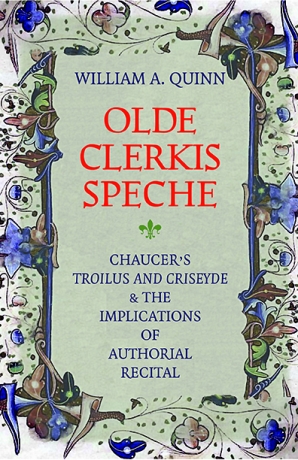- Home
- literary criticism
- Olde Clerkis Speche
Preparing your PDF for download...
There was a problem with your download, please contact the server administrator.
Olde Clerkis Speche
Chaucer's Troilus and Criseyde and the Implications of Authorial Recital
Imprint: Catholic University of America Press
Olde Clerkis Speche affirms both the historical legitimacy and the interpretive benefits of reading Troilus and Criseyde as if the text were initially composed for Chaucer’s own recital before a familiar audience. Proposing a qualification rather than contradiction of the "persona" as a reading premise, Quinn revitalizes the interpretive context of Chaucer’s original performance milieu. The central five chapters offer a "close hearing" of the possible tonal strategies of each book of Troilus and Criseyde during actual recital. Particular attention is given to expressions now normally overlooked, phrasing that does not advance the modern reader’s appreciation of plot or character development or theme; such "filler" did, however, once offer Chaucer's own "reader response" (or ennaratio) during the recital event. These five chapters simultaneously evaluate the probability that Chaucer himself revised each recital installment for subsequent manuscript circulation. All together, these chapters provide a sustained case study of the interplay between the author's anticipations of recital presence and textual absence.
Although this study does not pretend to detail an inaugural staging of Troilus and Criseyde , it does attend to the histrionic potential of Chaucer's own "speche/ In poetrie" (T&C V. 1854-5). The final chapter discusses how such a recital premise impacts several current controversies among Chaucerians, including the dating of Chaucer's individual acts of composition, the underlying assumptions regarding the "publication" of each text, the editorial imposition of punctuation on the manuscript record, and the poet’s increasing anxiety regarding his future absence from the reading event. Olde Clerkis Speche will be of interest to all readers of Chaucer as well as everyone interested in performance theory and the history of reading.
WILLIAM QUINN is professor of english at University of Arkansas, Fayetteville.
"William Quinn argues convincingly that any Chaucerian text was initially composed for authorial recital and then revised for manuscript circulation -- and at the same time he brings Chaucer to life as though you could hear him."
~Terry Jones, member of Monty Python and medievalist
"William Quinn’s Olde Clerkis Speche provides a case study for doing this type of philological work. Taking it as a model, one could apply Quinn’s method to a range of medieval texts. The book’s index is useful and bibliography full up to its original publication date. Recommended to advanced undergraduate and graduate students, Chaucerians, scholars of medieval oral-aural poetics, and libraries supporting medieval studies."
~Studies in Medieval and Renaissance Teaching
"…an original, sensitive reading of the tonal qualities of the poem along with other remnants of oral delivery that support the reasonable claim that some of what Troilus and Criseyde means is derived from how Chaucer read it aloud. As such Quinn’s book constitutes a major contribution to an area of Chaucer studies that has been important since the 1930s, and it will likely remain the standard discussion of oral delivery in Troilus and Criseyde for some time."
~D.W. Hayes, CHOICE
"Quinn’s study is a thought-provoking addition to Chaucer scholarship."
~Mary Flannery, The Times Literary Supplement
"Olde Clerkis Speche is an interesting and important addition to Chaucerian scholarship and its conclusions are both sound and provocative."
~Jacob Lewis, Mediaevistik

